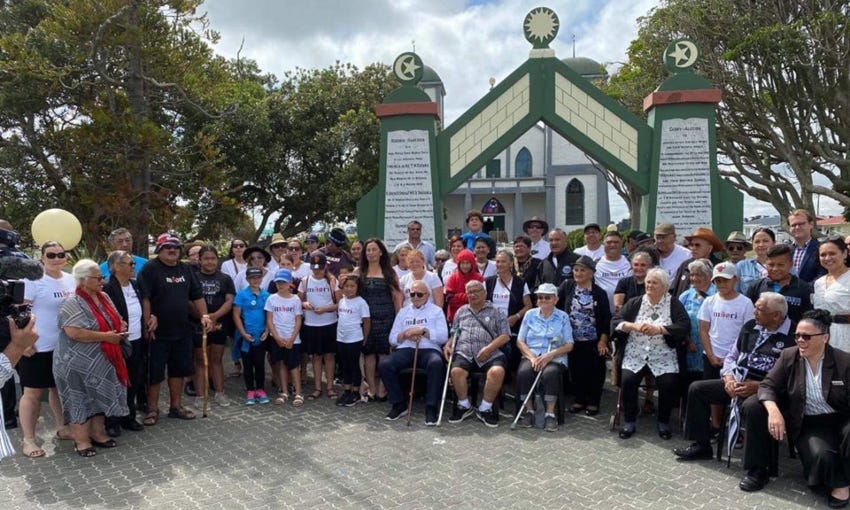Māori Party revival gathers steam
They've got a clear path back to parliament, provided the right candidates come forward

Good morning and welcome to The Bulletin for Monday 27 January, by Alex Braae for The Spinoff. Presented in partnership with Z Energy.
In today’s edition: Māori Party revival gathers steam, Coronavirus response screening stepped up, and rural economists predict dairy land value slide.

Image: Māori Party supporters at Rātana (via Facebook)
A clear theme has emerged from the political gathering at Rātana this weekend – the Māori Party are getting ready for a serious tilt at the 2020 election. While issues around Oranga Tamariki taking children from Māori families and Ihumātao provoked huge reverberations last year, the Whānau Ora funding controversy that has erupted this year provides the clearest sign yet that many in Te Ao Māori see the need for an independent Māori voice in parliament. That is despite a defence of Labour's record on Māori issues being put up by PM Jacinda Ardern at Rātana, the focus of this Radio NZ story.
There is still a long way to go, and many candidates still to be announced. Technically, the party doesn't even have co-leaders right now. John Tamihere gave Māori TV a quote about whether he would run in Tāmaki Makaurau, and while it was non-committal, he did say he was "not prepared to stand by and watch a Māori design, to Māori, by Māori for Māori policy be destroyed by stealth." In contrast, Matthew Tukaki of the NZ Māori Council has ruled out standing for the party, according to Waatea News. As an aside, the MMP system also gives the Māori Party a much clearer path to parliament than that of other minor parties, as they are much better placed to win one of the seven Māori electorates than most parties are to clearing the 5% party vote threshold. It also means that candidate selection is vitally important, because so much hangs on winning individual races.
In terms of how a hypothetical Māori Party return to parliament would affect the political balance, that isn't yet clear. The party formed in direct opposition to the risible Foreshore and Seabed legislation from the previous Labour government, and senior MPs held ministerial posts in subsequent National governments. That led to a perception that they were effectively secure allies of National – the much more complex reality is laid out in this excellent analysis from 2017 by Morgan Godfery. But even so, the party has arguably shifted left again since leaving parliament.
That was one of the points made by former Green candidate in Te Tai Hauāuru Jack McDonald, who has formally endorsed the Māori Party candidate for this year's election Debbie Ngarewa-Packer. As he put it, "the new leadership of the Māori Party under Che Wilson and Kaapua Smith represents a younger and more progressive generation of Māori leadership." Wilson himself told the NZ Herald (paywalled) that there was a clear message from the party's voters that they'd prefer for them to work with Labour. And yet, as Pattrick Smellie at Business Desk (paywalled) pointed out, National and the Māori Party have had a very effective working relationship in the past, along with some philosophical similarities that could be the basis of a future relationship.
Increased measures to detect the spread of coronavirus will be taken at airports, reports Radio NZ. Public health experts believe it will eventually arrive here, with a small number of cases now popping up in Australia. At least 56 people have now died from the virus, with more than 2000 cases worldwide.
Rural economists at Rabobank are predicting a slide in the value of dairy farming land over the next five years, reports Farmers Weekly. That's because of a range of looming challenges for the sector, both relating to government policy and changing lending behaviour of banks. There is also the open question of what the farmgate milk price will do – if it really falls, a lot of farmers will find themselves making a loss, with much less chance of selling up either.
Tens of thousands of dollars were spent by the Porirua City Council to check out six unusual petrol refills of the mayoral car by former mayor Mike Tana. Stuff's Joel Maxwell reports the $76,000 cost of the checks have been defended by chief executive Wendy Walker, who says she followed the correct process, and made the right decision. But Tana – who sometimes alluded to the idea that Council staff were working against him during his solitary term – criticised the investigation as a massive waste of money, and continues to insist that he did nothing wrong. The total petrol spending, by the way, was less than a thousand dollars, and councillors voted after the election that no further action should be taken on the matter.
Protests against the rollout of 5G have taken place in Auckland and Christchurch, reports Radio NZ. They want more research to take place, and more public consultation, before the full rollout. Feature writer Susan Strongman did a pretty comprehensive look into the campaign against 5G last year, along with the science around it, and just to make it clear, the Ministry of Health have no concerns around whether 5G is dangerous.
Many of Tauranga's most expensive houses aren't really worth the land they're sitting on. That's the conclusion of this interesting feature from the BOP Times (paywalled) looking into one of the distortions caused by the city's explosive property price growth of recent decades. It means the price of sections has also gone up to ridiculous levels, which will likely have flow on effects for what sort of housing then gets built on it.
Water restrictions have started to come in around the Wairarapa, reports the Times-Age. It's extremely dry down there right now, and the Waingawa River which is the main source of drinking water for Masterton is very low. As well as that, I saw for myself this weekend that a lot of the small streams around the south coast are pretty much dry. At this stage, there's a sprinkler ban in place, but with very little rain forecast over the next month, that could well end up being extended to a full garden watering ban.
Got some feedback about The Bulletin, or anything in the news?
Drop us a line at thebulletin@thespinoff.co.nz
Right now on The Spinoff: Scott Hamilton writes about the need to acknowledge our history of anti-semitism. Alice Webb-Liddall writes about the incredible changes in NZ TV that The Dead Lands could bring. Guarav Sharma draws connections around decolonisation between Māori and Indian people. Gemma Major gives a really useful guide for to how to support new mums. Cate Owen argues that political parties shouldn't get your vote unless they sign up for Facebook's ad transparency tool. John Berry covers some of the complexities in Kiwisaver investments in weaponry, that might also have useful civilian applications. Speaking of Kiwisaver, Jihee Junn outlines how to pick the right fund to get on top of yours. The Real Pod is back for another year, with plenty more weird and wild telly to sink their teeth into.
And the must-read piece of the weekend: Michael Andrew tells the remarkable story of Waiheke Island AFC, the rapidly rising football club packed with Latin American flair, and the challenges of keeping such a diverse team together. What I loved about the piece is that it captured how an amateur sports team can become what the community around it lives and breathes, for better and worse.
For a feature today, a story of mistakes and redemption in sports media. The Only A Game podcast (written piece also attached) has talked to Anthony Federico, a former ESPN online editor who torched his own career by unintentionally writing a racist headline about NBA player Jeremy Lin. But it's the journey that Federico had afterwards which is the really interesting part. Here's an excerpt:
"I appreciate that that was a headline that I should have foreseen the consequences to," he says. "And I would have loved to have been defended — that I was a good employee for a number of years, and that everyone who knew me at the company spoke very highly of my character.
"Those were the worst 30 days of my life," he says. "I filed for unemployment, which is humbling. My family was great. My close friends were great. I started looking for work, but I was, as you might imagine, pretty toxic in the sports media industry. I thought that I didn't deserve what happened to me, and I blamed God for that. And I thought about killing myself several times.
"And then Jeremy Lin himself reached out to me."
A perfect weekend for New Zealand's Sevens teams, with both winning the title in Hamilton. The NZ Herald reports the Men beat France, and the Women beat Canada to complete the double. Both currently top the standings in their respective series, but with plenty of footy still to play and some serious challenges from the chasing pack to see off.
In contrast, it has been a pretty poor weekend for New Zealand's cricketers. The Black Caps are 2-0 down against India, and the White Ferns are also behind in their series against South Africa after one game. While the Indian men are probably the best team in the world right now and so their results are expected, for the Ferns this could be seen as something of an upset loss – South Africa are marginally below them in the rankings, and have won only a small fraction of their games against New Zealand. Game 2 of the series takes place today at Eden Park.
The Auckland Tuatara have clinched a playoff spot in just their second season in the Australian Baseball League. This piece from Stuff's David Long is a wonderful look at some of the players who haven't made so many waves, but played a crucial role along the way to winning the division. Playoff games will start next weekend.
And finally, the Silver Ferns have made the final of the Nations Cup, with that game against Jamaica on right now. Newshub have a live updates page running, and at the time of writing the Silver Ferns are two points behind, so it could turn into a thriller.
That's it for The Bulletin. If you want to support the work we do at The Spinoff, please check out our membership programme.




